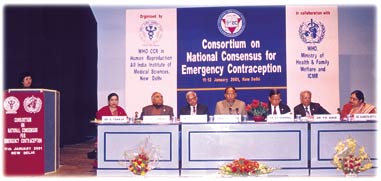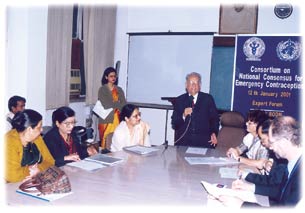WHO-CCR
in Human Reproduction at AIIMS has completed 2 decades of fruitful collaboration
with WHO Special Programme for Research and Development in Human Reproduction.
One of the major areas of WHO-CCR research activities is post-ovulatory methods
of contraception. A Consortium on National Consensus for Emergency Contraception
was organised in New Delhi by WHO-CCR in Human Reproduction, AIIMS, in collaboration
with the Ministry of Health & Family Welfare, ICMR and WHO, on January 11-12,
2001. During the Consortium the experts deliberated on different issues involved
in the introduction of Emergency Contraception in India.
This Consortium aimed at arousing the reproductive and family planning healthcare
providers, national policy-makers, public and private sector, pharmaceutical companies
and community at large, to the need of introduction of Emergency Contraception
in our National Health and Family Welfare Programme.
The Consortium was inaugurated by Dr C P Thakur, the Hon’ble Minister of Health
and Family Welfare. The activities of the consortium included, open forum on day
1 and Expert forum on day 2. On first day everyone interested for the cause of
EC was welcome to participate in the Open Forum. On the second day, during the
Expert Forum the experts participating in the Consortium deliberated on different
issues related to EC introduction in India and reached a consensus.
 The
Open Forum of the Consortium was a unique opportunity to promote information exchange
between experts and participants. Over 350 participants attended and actively
contributed during the interactive lectures, debates and panel discussion on strategies
for Emergency Contraception introduction. The
Open Forum of the Consortium was a unique opportunity to promote information exchange
between experts and participants. Over 350 participants attended and actively
contributed during the interactive lectures, debates and panel discussion on strategies
for Emergency Contraception introduction. The
Open Forum comprised five sessions where experts from WHO, Ministry of Health
and other world authorities on Emergency Contraception addressed the delegates.
The primary focus was to review the current status of Emergency Contraception.
Research findings and experience of other countries already having EC in their
family planning programmes were shared, and the strategies for EC introduction
in India were outlined. There were interesting and thought-provoking debates and
panel discussion. The topics covered included
: - Advances in methods of
Emergency Contraception – drugs, mechanism of action, effectiveness, side-effects
and current consensus on the best method.
- Emergency Contraception : Global Activity – global scenario of emergency contraception,
Global EC Consortium, experience of EC introduction in other countries and strategic
approach to EC introduction. - Emergency
Contraception : Indian Perspective – current experience of EC in India including
profile and perceptions of EC users and providers, application of technology to
rural areas, constraints in EC introduction, role of NGOs.
- Debate on controversial issues for EC introduction in India including availability
over the counter, publicity, encouraging promiscuity, decreasing regular contraceptive
use, repeated misuse, etc. - Panel discussion
on strategies for introduction of EC in India – role of professional and regulatory
bodies, women’s health and gender perspectives, legal and ethical aspects and
type of media approach required.
Participants in the Expert Forum on the second day of the Consortium included
:  •
national and international technical experts •
national and international technical experts
• experts from countries with
experience of EC introduction
• policy-makers and planners
• representative
from Drug Controller of India
• representatives from Non-Government Organizations
•
social scientists
• service-providers
• representatives from pharmaceutical
companies
• media experts including medical journalists
• representatives
from women’s groups
• university teachers and students
• legal and ethics
experts
Prominent dynamic leaders
in their respective fields and those interested in women’s health were chosen
to reflect on the current status of Emergency Contraception in India and forge
a vision for the future. Overall, 126 experts participated in the Expert Forum.
 Central
to the Expert Forum were six small-group discussions that focussed on key issues
related to EC introduction in India, and consensus on how to introduce EC in India.
The Expert Forum had issue-based discussions on the following topics : Central
to the Expert Forum were six small-group discussions that focussed on key issues
related to EC introduction in India, and consensus on how to introduce EC in India.
The Expert Forum had issue-based discussions on the following topics :
- Dedicated Method of choice for Emergency Contraception in India
-
Pre-introduction IEC and media campaigns for public awareness
-
Training curriculum of healthcare providers for Emergency Contraception services
-
Ideal approach to introduction and distribution of Emergency Contraception to
the masses
- Client information and counselling for
safe usage of Emergency Contraception
- National monitoring
of the programme
Experts were called
upon to think creatively and to recommend specific consensus on issues raised
before the specific groups. Two co-ordinators from each Group provided the background
material for discussions and a facilitator moderated each small-group discussion
to reach a consensus. Each group then presented
the recommendations to Shri A R Nanda, Secretary (FW) to the Govt. of India in
the MOHFW. He played a highly active leadership role, which encouraged active
participation from all members of the Expert Forum. A very lively discussion occurred
before reaching the final consensus on each of the issues. Wherever appropriate,
Shri A R Nanda summed up the recommendations with women’s health issues getting
top-priority therein. The consensus statements and recommendations included in
the final report have his approval. The Consensus Statements are addressed to
all policy-makers, planner, healthcare providers, women’s advocates and women
themselves and aim at improving the overall Reproductive Health of women in India. This
Consortium was held with following three main purposes :
First,
to update everybody concerned with reproductive healthcare and contraception on
the latest advances in Emergency Contraception;
Second, to discuss and
debate the strategies for EC introduction in India; and
Third, to set
forth the guidelines for introducing emergency contraception in India.
Back
to Top
|